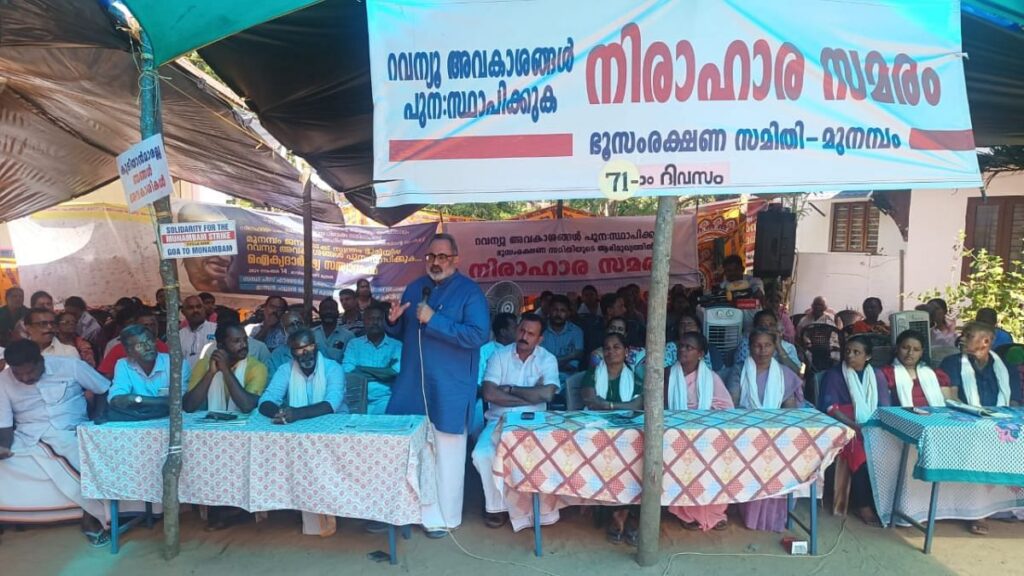Thiruvananthapuram: The Waqf (Amendment) Bill, 2024, re-introduced by the Centre in the Lok Sabha Wednesday, has found the support of the catholic body in Kerala, which has urged the MPs from the state to back it in Parliament.
The Kerala Catholic Bishops’ Council (KCBC), an association of the catholic bishops of the Roman, Syro-Malabar and Syro-Malankara churches in the state, had issued a statement in support on 29 March. At the heart of the decision is the Munambam land dispute, which they hope the bill will help resolve.
Over 600 families in Munambam have been protesting since last year for the reinstatement of their revenue rights as a 400-acre stretch, where their houses are located, has been declared a Waqf asset by Kerala’s Waqf Board.
Father Thomas Tharayil, KCBC’s deputy general secretary, told ThePrint that the council’s support to the bill is solely for the welfare of Munambam’s residents.
“We understand that the bill will address some sections of the Act that will eventually help resolve the Munambam issue. It’s a humanitarian issue and is happening in several parts of India. There are sections in the Act that need to be changed to safeguard the rights of people living on these lands, irrespective of which community they belong to,” the bishop said.
The more than 600 families in Munambam, located about 40 km from Kochi, are locked in a tussle with the Waqf Board. Since 2022, the residents have not been allowed to pay property tax in line with the board’s direction to the revenue department.
The 400-acre land, occupied by the fishing community since the 1980s, originally belonged to the Travancore royal family, and was leased out to a trader named Abdul Sathar Moosa Sait in 1902.
Later, a successor handed over the land to Kozhikode-based Farook College, a government-aided college, established to empower the socially backward classes. A Waqf deed was registered in 1950 following this handover. Most of the residents in Munambam now belong to the fishing community from the Latin Catholic church. A waqf deed is a legal document that establishes the permanent dedication of a property under Islamic Law.
Though Munambam residents began their fight with the help of local politicians and moved the court in 2022, the issue gathered momentum in September last year after the state’s Bharatiya Janata Party unit sought action by the Waqf Board. This was a month after the party’s central leadership pushed for the amendment in the Waqf Act, 1995, in Parliament. Later, the issue was supported by the state’s influential Syro-Malabar church.
Following the protest, the Kerala government had formed an inquiry commission led by former Kerala High Court acting chief justice Ramachandran Nair to look into the matter in November 2024, but it was overturned last month by the high court.
“It’s a religious law imposed on the entire country. The families bought the land legally and registered. It’s not right when they can’t access their rights to handle it,” Father Antony Vadkkekkara, associated with the Syro Malabar church, told ThePrint. All political parties, including the Indian Union Muslim League (IUML), should vote in favour of the bill.
First presented in Lok Sabha in August 2024, the Waqf (Amendment) Bill, 2024, was sent to a Joint Parliamentary Committee (JPC).
The bill seeks to make changes in the 1995 Act with respect to managing and regulating Waqf properties, such as the inclusion of non-Muslim members in the Central Waqf Council and Waqf Boards, managed according to Muslim law. The district collector will become the survey commissioner and will have the power to survey Waqf properties, if the amendment bill is passed. It also proposes to remove the provision deeming the tribunal’s decision final in matters related to waqf property.
“This is our day. None of the MPs from the state stood for us and supported the bill in Parliament. But the central government understood our concern and are making amendments to the Act,” said Joseph Benny, a Munambam resident, who has been leading the protest that completed 172 days Wednesday.
Benny, however, said that they will not end their protest even after the bill is passed, and will continue until the residents get their revenue rights back.
(Edited by Mannat Chugh)
Also Read: ‘Even Parliament could’ve been claimed as Waqf property’: Kiren Rijiju defends amendment bill in LS


